jeudi, 10 mai 2018
Editions Bios, Colloque de Lille, 9 mars 2018 - Les interventions
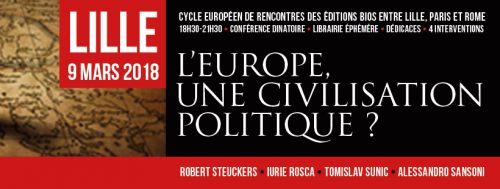
Editions Bios, Colloque de Lille, 9 mars 2018
Les interventions
Les éditions BIOS organisaient le vendredi 9 mars 2018 à Lille une conférence intitulée « L’Europe, une civilisation politique ? La politique pour éviter la guerre ! ».
L’équipe d’ERTV était sur place et vous propose aujourd’hui les interventions de Robert Steuckers, Tomislav Sunic, Pierre-Antoine Plaquevent et Alessandro Sansoni en vidéo.
Première partie: Intervention de Robert Steuckers
Deuxième partie: intervention de Tomislav Sunic
Troisième partie: intervention de Pierre-Antoine Plaquevent
Quatrième partie: intervention d'Alessandro Sansoni
12:18 Publié dans Actualité, Affaires européennes, Evénement, Synergies européennes | Lien permanent | Commentaires (0) | Tags : alessandro sansoni, pierre-antoine plaquevent, tomislav sunic, robert steuckers, éditions bios, europe, affaires européennes, événement, lille, synergies européennes |  |
|  del.icio.us |
del.icio.us |  |
|  Digg |
Digg | ![]() Facebook
Facebook
Ukrainian Nationalist Perspective of the Events in Ukraine and the Third Geopolitical Way
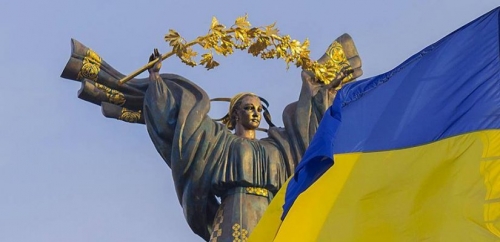
Olena Semenyaka:
Ukrainian Nationalist Perspective of the Events in Ukraine and the Third Geopolitical Way
NOTE DE LA REDACTION: Ce texte émane d'Olena Semenkaya, théoricienne de la révolution conservatrice allemande en Ukraine, dont elle cherche à appliquer les principes dans la réalité ukrainienne d'aujourd'hui. Elle travaille sur une thèse de doctorat qui sera consacrée à Ernst Jünger. Elle est membre du Haut-conseil du Corps National, branche politique du Mouvement néo-nationaliste ukrainien Azov, chargée des relations internationales, coordinatrice du réseau paneuropéen Reconquista et du projet géopolitique Intermarium.
Inutile de préciser que ses thèses sur la révolution conservatrice rencontrent notre plus vif intérêt, d'autant plus qu'elles s'expriment, non pas dans le "Grand Hospice" occidental fustigé par Edouard Limonov, mais dans une zone de grande effervescence politique, comme le furent sans aucun doute les premières années de la République de Weimar.
En revanche, les positions antirusses irrationnelles des mouvements qu'elle anime et patronne, nous les percevons comme dangereux pour l'ensemble de l'écoumène européen qui devrait, comme nous l'avons maintes fois répétés, retrouvé l'harmonie de l'alliance franco-austro-russe du 18ième siècle et de la Sainte Alliance pentarchique née à Vienne en 1814. Géopolitiquement parlant, il nous est impossible de théoriser un abandon du bassin de la Volga et des richesses sibériennes ou de renoncer à tout accès direct à l'espace de la Caspienne. Ensuite, les forces dites "illiberal" doivent unir leurs efforts et non pas se disperser en des combats fratricides.
Mais ce qui est le plus intéressant, et en même temps, le plus amusant dans cette étude qu'elle livre ici pour une revue allemande, en l'occurrence Gegenlicht, c'est sa critique féroce de la russophilie de ce qu'il est convenu d'appeler la "Nouvelle Droite": sa cible favorite, qui l'eût cru, est évidemment Alexandre Douguine mais elle n'épargne pas davantage les frères ennemis de la ND française, l'inénarrable de Benoist et l'homme que ce dernier n'a cessé d'injurier et de calomnier, Guillaume Faye. A ce duo s'ajoutent Robert Steuckers et Pavel Toulaev (Tulaev) même si on sent bien qu'Olena Semenkaya s'est bien amusée à lire leur entretien, consacré à divers sujets dont la ND (voir bibliographie en fin d'article). Douguine, Benoist, Faye, Steuckers et Toulaev prennent quelques volées de bois vert. Steuckers estime que cette fureur féminine est amusante et ne voit aucun inconvénient à ce qu'elle figure sur la grande toile, y compris sur des sites fréquentés par ses lecteurs; il a toujours brocardé les "gourouïsmes" inféconds du milieu néo-droitiste, l'article d'Olena Semenkaya pouvant dès lors servir d'antidote à ceux qui y succombent et qui veulent faire de lui, à son corps défendant, un gourou aussi ridicule que les autres.
De plus que ce texte permet de mieux comprendre l'imbroglio ukrainien, pour autant que cela soit possible, ici, en Europe de l'Ouest. Olena Semenkaya doit comprendre que l'extrême complexité des clivages à l'oeuvre en Ukraine laisse bon nombre d'observateurs perplexes.
Sur le sujet on lire un article didactique en langue espagnole:
https://slavyangrad.es/2017/01/13/el-contexto-ideologico-...
* * *
Olena Semenkaya:
During the past year after Maidan Ukrainian intellectuals have been mostly preoccupied with refuting anti-Ukrainian fake news and answering the interviews rather than developing a coherent analysis of the events at Maidan or at least criticizing its accounts by the most authoritative figures in the New Right community – Alain de Benoist and Guillaume Faye. The information warfare on occasion of the Ukrainian conflict may be fairly regarded as a climax of postmodern, for in this case the infamous simulacra not only function as real, but overpower every ideology due to the total domination of mass media over people’s minds, unprecedented historical ignorance of recipients and such a strong anti-“fascist” neo-Soviet propaganda in Russia that the practice of denazification in the post-war Germany looks like a delicate therapeutic procedure.
The anti-Russian highlights of the Western media might be double-standard and hypocritical, but the Russian drivers of an anti-Ukrainian hate machine, which is worse, do believe in their own lies, and people stick to it (for instance, a story of the crucified by the Ukrainian National Guard little boy in the recaptured city of Slovyansk) even when it is denied by their own idols like Igor Strelkov (Girkin), which is a way of recruiting the new fighters for the “Novorussian” militia. Thus the developments in Ukraine and Russia give more data to psychiatrists and sociologists than historians and philosophers.
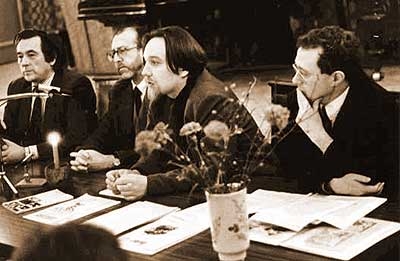
Début avril 1992: conférence de presse à Moscou: de gauche à droite, Alexandre Prokhanov, ancien rédacteur-en-chef de "Lettres soviétiques" et directeur du journal Dyeïnn, Alain de Benoist, Alexandre Douguine et Robert Steuckers.
Even though both of the aforementioned thinkers tried to offer a balanced overview of the Ukrainian situation, and de Benoist admitted the split among the revolutionaries, the most passionary part of which transcends the false geopolitical dilemma between the EU / NATO and the Russian Federation [1], their main premises are in full accord with the interpretative axioms of the leader of neo-Eurasianism Alexander Dugin whose strategy may be summarized in terms of four basic aspirations: 1) to reduce the complexity of the cultural-historical relations between the Russian Empire and its heir, the Russian Federation, and Ukraine to geopolitics and the geopolitical rivalry of the US and Russia over Ukraine and Europe; 2) to deconstruct the historical and geopolitical ambitions of the Ukrainian Right and their claims to represent the Third Position and thus to show that they are at best the useful idiots of Euro-Atlanticism and Ukraine is a playground of another colour revolution in service of the American hegemony; 3) to make everyone associate resistance against the new world order and, arguably synonymously, the ideal of “the multi-polar world” under Russian protection namely with the project of “Novorussia” and Putin; 4) to emphasize disappearance of the communistic camp (two-polar world), silence the fact that the Soviet Union was a co-founder of the NWO that criminalized German and, consequently, European national self-awareness and to denigrate “ethnonationalism” as favorable for the America-dominated one-polar world “fascism.”
These cornerstones of Dugin’s fourth (after liberalism, communism and fascism / Conservative Revolution) political theory were accepted by de Benoist a long time ago: his thematic work was published in Russian under the title “Against Liberalism: to the Fourth Political Theory” in 2009 before a visit to St. Petersburg and after his participation in the Moscow conference in 2008 which were organized by Dugin. During these visits de Benoist defined liberalism as the main enemy and confirmed his cooperation with the Eurasianist movement as the only real alternative of mondialism and American hegemony. In other words, Alain de Benoist, as a co-founder of the 4PT, in his analysis of the Ukrainian conflict simply restated similar to Dugin’s ideas in a more moderate manner.
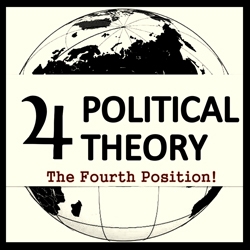 Moreover, Dugin himself drew inspiration from de Benoist’s version of the New Right when he wrote his introduction to Conservative Revolution in a monograph of the same title back in 1994. As a result, the residents of the post-Soviet countries who had no access to the original sources since the very beginning perceived “failed” Conservative Revolution (the 3PT) as a prelude to the pro-Soviet “Young Europe” of Jean Thiriart, the French New Right of Alain de Benoist and Eurasianism as such that don’t repeat the “anti-Soviet” mistake of their predecessors. Thus Dugin singles out one of the conservative-revolutionary trends, the National Bolshevik, which favors the Soviet Union, more precisely, the National Bolshevik group led by Ernst Niekisch within the classic national-revolutionary direction and portrays it as the only relevant one.
Moreover, Dugin himself drew inspiration from de Benoist’s version of the New Right when he wrote his introduction to Conservative Revolution in a monograph of the same title back in 1994. As a result, the residents of the post-Soviet countries who had no access to the original sources since the very beginning perceived “failed” Conservative Revolution (the 3PT) as a prelude to the pro-Soviet “Young Europe” of Jean Thiriart, the French New Right of Alain de Benoist and Eurasianism as such that don’t repeat the “anti-Soviet” mistake of their predecessors. Thus Dugin singles out one of the conservative-revolutionary trends, the National Bolshevik, which favors the Soviet Union, more precisely, the National Bolshevik group led by Ernst Niekisch within the classic national-revolutionary direction and portrays it as the only relevant one.
According to Dugin’s “Conservative Revolution,” the progress of de Benoists’ New Right consists in refusal from white supremacism and Euro-centrism along with westernalism and capitalism: the new rightists fight not against immigrants, but against immigration and not for the people (their own nation), but for the peoples [2]. As a result, the reader gets a distorted idea of the “Old Right”: firstly, it is almost reduced to the media representation of Nazism, secondly, the Conservative Revolution is described as a theory devoid of the methodological and theoretical (above all, geopolitical) foundations for the effective resistance against the left-liberal world order at the global level and securing diversity of traditions and nations. In addition, the idea of old Europe as a cultural and mythological, even a sacred center vanishes; this role is also hijacked by the “real” Third Rome Moscow, which is unequivocally associated by the Russian Right with the multicultural Carthage, “Moscwabad.”
Jean Thiriart et Alexandre Douguine à Moscou, en 1992.
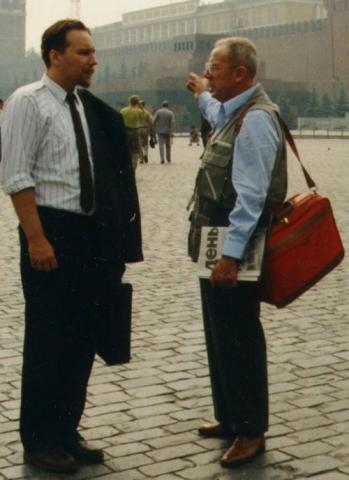 Belgian right-wing writer and politician Robert Steuckers who advocates his own version of Eurasianism and welcomed the National Bolshevik shift in the French New Right as a way to overcome “petty conservatism” and “alternative liberalism” at the same time severely criticized de Benoist’s opportunism and fear of being labeled a far right extremist, according to his subjective experience of collaboration with the French “Guru” and his followers. Probable ideological rivalry and Steuckers’ own pro-Russian position aside, he shares an opinion that the attempts to bury the conservative-revolutionary authorities by some new rightists are a bit hasty, which proves his story about de Benoist’s admirer Toto-Lapin (“…he shouted in the middle of the pub, next to the astonished other guests, “Alain de Benoist is the greatest philosopher of the 20th Century!”. “Maybe” answered Bresnu ironically, “but what about Heidegger then…?”. Toto-Lapin: “He has only paved the way for Alain de Benoist…”. We both burst out laughing…”) [3]. It’s doubtful that de Benoist himself, who was very fond of Heidegger, would make similar arrogant statements, the same as Dugin, but looks like both of them cast out colleagues whose views are somehow different, which also follows from my experience of communication with Eurasianists.
Belgian right-wing writer and politician Robert Steuckers who advocates his own version of Eurasianism and welcomed the National Bolshevik shift in the French New Right as a way to overcome “petty conservatism” and “alternative liberalism” at the same time severely criticized de Benoist’s opportunism and fear of being labeled a far right extremist, according to his subjective experience of collaboration with the French “Guru” and his followers. Probable ideological rivalry and Steuckers’ own pro-Russian position aside, he shares an opinion that the attempts to bury the conservative-revolutionary authorities by some new rightists are a bit hasty, which proves his story about de Benoist’s admirer Toto-Lapin (“…he shouted in the middle of the pub, next to the astonished other guests, “Alain de Benoist is the greatest philosopher of the 20th Century!”. “Maybe” answered Bresnu ironically, “but what about Heidegger then…?”. Toto-Lapin: “He has only paved the way for Alain de Benoist…”. We both burst out laughing…”) [3]. It’s doubtful that de Benoist himself, who was very fond of Heidegger, would make similar arrogant statements, the same as Dugin, but looks like both of them cast out colleagues whose views are somehow different, which also follows from my experience of communication with Eurasianists.
Likewise, sarcastic reconstruction of de Benoist’s ideological maneuvers by Steuckers is worth quoting as valid with regard to Dugin’s 4PT: “…Alain de Benoist tried to demonstrate that the “New Right” was in fact the real “New Left” and the true inheritor of Marx’ ideas as well as the devoted intellectual protector of the masses of African and Muslim immigrants against the centralization and assimilation efforts of the alleged “xenophobic” French State’s system, while the “New Left” was genuinely a neo-conservative islamophobe movement… [de Benoist] wrote all that very seriously, in the credulous hope he would have been finally taken as a genuine leftist by the Left and would have transformed his alleged false rightist young fellows in true new leftists more leftist than the usual leftists…” [4]. In spite of his Euro-Siberian solidarity, Steuckers underlines that Leontiev’s and Gumilev’s equation between Europe and the West, which was adopted by Dugin’s neo-Eurasianism, is not acceptable: firstly, the subversive Western spirit entered Russia in form of Bolshevism; secondly, it excludes Western Europeans from the area of the future political reconquest and threatens with reactivation of “the worst aspects of Nazi or NATO propaganda,” which already happens today.
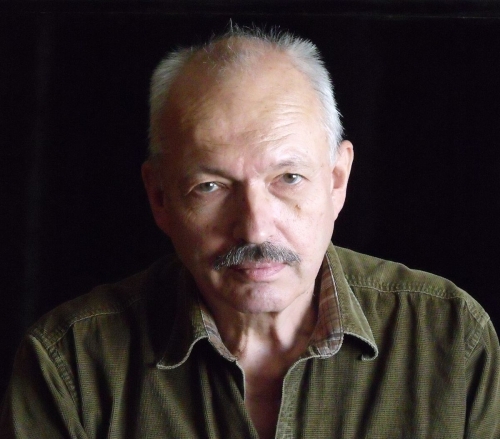
Oleg Bakhtiyarov.
In this context I would like to mention an opinion of the Russian-Ukrainian scientist Oleg Bakhtiyarov who, overall, justifies Putin’s struggle for the world domination or at least one of the leading roles in the global politics, albeit at the expense of Ukraine, but believes that Putin made a big mistake when he did not support “Right Sector” and the Ukrainian rightists in general, back then united under this title, who were against joining the EU [5]. As a matter of fact, the latter were the only possible allies of Putin if he wanted to prove that Russia does not threaten Ukrainian sovereignty and national identity. He chose the opposite forceful way and understood that his main enemy was a pro-Western “junta” only after the presidential and parliamentary elections which showed that Ukrainian nationalists either did not have such a big support of population, or lacked resources and influence to gain a decisive political victory. Moreover, the Kremlin’s propaganda made a scarecrow of “Right Sector” as an embodiment of the Ukrainian Right not only in the Russian but also the Ukrainian society that voted for the liberal forces in order “not to provoke” Putin, but it was too late to regret weakening the national-revolutionary factor in Ukraine when the Kremlin realized that the new government was far more pro-EU than the Maidan “radicals.” After Putin changed its strategy and turned “the junta” into the main target of the anti-Ukrainian information warfare, further denigration of the Ukrainian rightists as “the pseudo-revolutionary puppets of the pro-Western oligarchs” was, actually, odd, the same as sporadic hopes of the “rebels” from “DNR” and “LNR” to form an alliance with “Right Sector” as the only political force that dares to challenge the Ukrainian authorities: Ukrainians were ready to unite with them only before they started capturing the administrative buildings under the Russian flags, and now thousands of the fallen Ukrainian soldiers make reconciliation impossible.
Besides, Oleg Bakhtiyarov fairly draws attention to the fact that after Maidan the Russian language in Ukraine reinforced its positions, because what really counts for Ukrainians today is only a pro-Ukrainian standpoint, heroic values and readiness for self-sacrifice in war for homeland, although speaking Ukrainian and wearing the traditional clothes have become “fashionable,” too. A lot of fighters of “Right Sector’s” DUK (Volunteer Ukrainian Corpse) are Russian speaking, not mentioning other military forces, especially the “Azov” regiment. Thus those who claim that Ukrainians violated the rights of Russian speaking population in East Ukraine and Crimea by depriving Russian of the status of the second state language, Guillaume Faye in particular, are ignorant: Russian has never been the second state language in Ukraine, including Crimea where it only had a special status. Reaffirming Ukrainian as the only official state language (which means a language of communication in state institutions) after Maidan was not provocative, only untimely, for raising this topic before the new government gained a popular support was a true “gift” for Putin. Today the key “junta” officials like Interior Minister Arsen Avakov also freely speak publicly Russian. Moreover, a big part of the political Ukrainian nation that is being created now, apart from the titular nation, by various national minorities, is represented namely by the ethnic Russians. Yet the Russian nationalists who fight on the Ukrainian side confess that Ukraine is a white paradise unknown to the multicultural Russia.
As a vanguard of the struggle for the multi-polar world in theory, in practice Russia and its new rightist glorifiers do not hesitate to sacrifice the national peculiarities of Ukraine or Baltic countries in the name of the new “traditional order”: after all, for them the “anti-Russian” Slavic and Western European nationalists are ungrateful and narrow-minded servants of the US and fascists who discriminate the rights of Russians or Russophobes. One does not have to be a liberal to see hypocrisy of these considerations; the New Right is fairly recognized as a mask for the same Old Left face, which was openly stated by de Benoist: “We’ll finally prefer to put on our heads Red Army caps than to finish as fat old guys eating disgusting hamburgers somewhere in a nasty Brooklyn lane” [6]. Thus the 4PT is not natural surpassing of the previous political theory under the changed historical conditions, but giving up the very idea of the Third Way, the geopolitical projection of which has always been the sovereign Mitteleuropa and which can never be reduced to mere geopolitics.
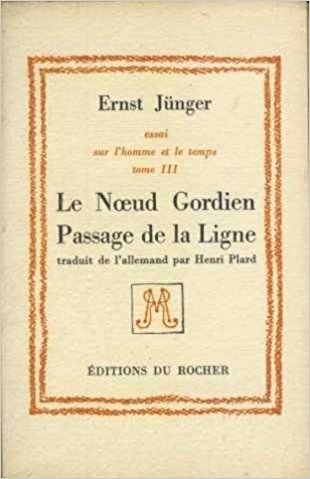 Such godfathers of Conservative Revolution as Ernst Jünger and Julius Evola did not abandon the Third Way in their post-war writings, which, in all fairness, may be estimated as the documents of a firm refusal from geopolitical reductionism that is a diagnosis and a sacred mantra of the vast majority of “experts” on the Ukrainian crisis; above all, it concerns their polemic on the East-West problem and its treatment in Jünger’s essay “The Gordian Knot.” It’s enough to read a concluding chapter of Evola’s classic “Revolt Against the Modern World,” in which he discusses the cultural and civilizational foundations of America and Russia as the two sides of the same coin, or his article “Presuppositions of the European Union,” in which Evola clearly explains not only his “third” geopolitical ideal, but the very condition on which building a genuine European union is possible: equal remoteness from Russia and the USA, “both “East” and “West,” that is to say from the two blocs which, like the arms of a single pair of pincers, are closing themselves around us” [7], to guess what would be his reaction to the 4PT. Ernst Jünger, who viewed experience of the USSR and the socialist camp in general as the brightest confirmation of his metaphysical theory of the Worker that mobilizes the world by means of technology, at the same time was far from embracing its cultural, social and political practice, thus disagreeing and polemicizing with pro-Soviet Ernst Niekisch. The same as in Evola’s case, namely metaphysics and culture were a reason for Jünger’s choice in favor of the third geopolitical way as stated in his treatise “Peace”: “With the destruction of our towns, Goethe's saying has ceased to apply to this extent, that America now possesses the tradition of construction which we require. Napoleon prophesied that in our day the world would become republican or Cossack. If he had foreseen our situation in detail he would have said “American or Russian,” as Tocqueville, too, long ago foretold. Although America, like Russia, will exert a powerful influence on Europe, neither of these two possibilities will be realized. Against them is the immense gravitational force of history, the treasure of old heritage, which has not only been formed by the spirit or art but still lives in men” [8]. Therefore, the geopolitical fetishism, according to which “there is only the geopolitical truth” and the proponents of which dismiss the struggle of Ukrainian patriots as unimportant due to the partial coincidence of their and Western interests, should be considered as alien to the traditionalist worldview. Armin Mohler, a legendary author of the classic research “Conservative Revolution in Germany, 1918-1932” and an original founder of the New Right, considered Americans more German friendly than Frenchmen and Englishmen and admitted that he was not that anti-American in this respect as de Benoist [9].
Such godfathers of Conservative Revolution as Ernst Jünger and Julius Evola did not abandon the Third Way in their post-war writings, which, in all fairness, may be estimated as the documents of a firm refusal from geopolitical reductionism that is a diagnosis and a sacred mantra of the vast majority of “experts” on the Ukrainian crisis; above all, it concerns their polemic on the East-West problem and its treatment in Jünger’s essay “The Gordian Knot.” It’s enough to read a concluding chapter of Evola’s classic “Revolt Against the Modern World,” in which he discusses the cultural and civilizational foundations of America and Russia as the two sides of the same coin, or his article “Presuppositions of the European Union,” in which Evola clearly explains not only his “third” geopolitical ideal, but the very condition on which building a genuine European union is possible: equal remoteness from Russia and the USA, “both “East” and “West,” that is to say from the two blocs which, like the arms of a single pair of pincers, are closing themselves around us” [7], to guess what would be his reaction to the 4PT. Ernst Jünger, who viewed experience of the USSR and the socialist camp in general as the brightest confirmation of his metaphysical theory of the Worker that mobilizes the world by means of technology, at the same time was far from embracing its cultural, social and political practice, thus disagreeing and polemicizing with pro-Soviet Ernst Niekisch. The same as in Evola’s case, namely metaphysics and culture were a reason for Jünger’s choice in favor of the third geopolitical way as stated in his treatise “Peace”: “With the destruction of our towns, Goethe's saying has ceased to apply to this extent, that America now possesses the tradition of construction which we require. Napoleon prophesied that in our day the world would become republican or Cossack. If he had foreseen our situation in detail he would have said “American or Russian,” as Tocqueville, too, long ago foretold. Although America, like Russia, will exert a powerful influence on Europe, neither of these two possibilities will be realized. Against them is the immense gravitational force of history, the treasure of old heritage, which has not only been formed by the spirit or art but still lives in men” [8]. Therefore, the geopolitical fetishism, according to which “there is only the geopolitical truth” and the proponents of which dismiss the struggle of Ukrainian patriots as unimportant due to the partial coincidence of their and Western interests, should be considered as alien to the traditionalist worldview. Armin Mohler, a legendary author of the classic research “Conservative Revolution in Germany, 1918-1932” and an original founder of the New Right, considered Americans more German friendly than Frenchmen and Englishmen and admitted that he was not that anti-American in this respect as de Benoist [9].
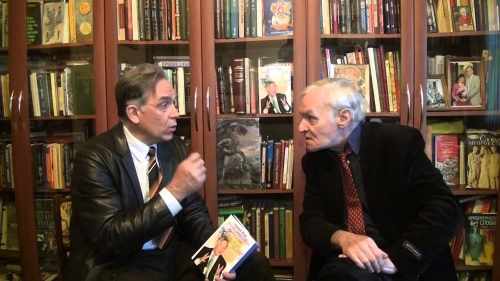
Un débat entre Pavel Tulaev et Guillaume Faye, à Termonde en Flandre.
The aforementioned quotations by Steuckers are taken from his interview (2014) with Pavel Tulaev, a Russian right-wing intellectual and a contact person for both Robert Steuckers and Guillaume Faye, who has also been on various occasions in Russia since 2005 to participate in the events organized by Tulaev. Theoretically a far more right-wing opponent of de Benoist who had to start his own school of the French New Right thought, which in this context means restoration of the normal conservative-revolutionary course, in reality Faye falls in exactly the same trap of celebrating the worst ideological biases of neo-Sovietism under the guise of “disappearance” of the communistic camp and the need to support “the only real alternative” of the NWO. Tulaev, who sent to de Benoist an issue of his Russian New Right journal “Athenaeus” and heard in response that this “far right,” almost “Neo-Nazi” edition had nothing in common with the theoretic platform of the real New Right under de Benoist’s supervision, in turn, accused the latter of the left-wing phraseology and attitudes and described their exchange as a remarkable historical event which proved that the Russian intellectuals finally abandoned the revolutionary populism and demagogy of the French Commune [10]. However, when it comes to the Ukrainian conflict, Tulaev repeats far worse demagogical Bolshevik clichés about the “Banderist fascists” who kill the Slavic people for American dollars, in comparison with which the accounts by Faye and de Benoist, taken together, look rather moderate [11].
L'ouvrage de Pavel Tulaev sur la Crimée: de Catherine II à Vladimir Poutine.
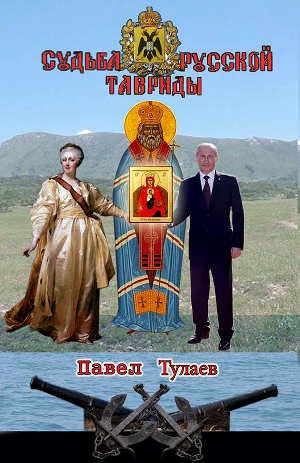 As an ideologist of Euro-Siberia, later the Euro-Siberian Empire, Faye owes his fame to different aspects of his theory, for in his highly acclaimed book “Archeofuturism” he displayed quite approximate, if not fantastic, knowledge of Russia. A logical summary of Faye’s visits to Russia has become his pamphlet “Frenchman’s View on Russia” (2012), which was not the climax of his fascination with the Russian genius, though: the titles of his recent thematic texts like “Viva Putin!” say it all. Given that, it’s no wonder that Faye calls hypocritical only American condemnation of violating the international law by Russia, but does not find outrageous the fact that the country that annexed Crimea not only was obliged to protect the territorial integrity of Ukraine in exchange for its renouncing the nuclear weapons according to the Budapest memorandum, but even dared to threaten Ukraine with a nuclear strike. Moreover, he believes that Russia’s response to the Western “aggression” was moderate and that Putin follows the rules, as opposed to the USA. Though little is expected from the right-wing idol who traces back the statist history of Ukraine from its membership in the USSR, considers Ukrainian independence from the Soviet Union purely nominal and believes that this “half-Russian” country would sooner or later “break up” itself [12], which is quite laughable, taking into account a current size of “Novorussia” thanks to the efforts of the Ukrainian military and active help of the “Russian” cities’ residents like Kharkiv, Odessa and Mariupol.
As an ideologist of Euro-Siberia, later the Euro-Siberian Empire, Faye owes his fame to different aspects of his theory, for in his highly acclaimed book “Archeofuturism” he displayed quite approximate, if not fantastic, knowledge of Russia. A logical summary of Faye’s visits to Russia has become his pamphlet “Frenchman’s View on Russia” (2012), which was not the climax of his fascination with the Russian genius, though: the titles of his recent thematic texts like “Viva Putin!” say it all. Given that, it’s no wonder that Faye calls hypocritical only American condemnation of violating the international law by Russia, but does not find outrageous the fact that the country that annexed Crimea not only was obliged to protect the territorial integrity of Ukraine in exchange for its renouncing the nuclear weapons according to the Budapest memorandum, but even dared to threaten Ukraine with a nuclear strike. Moreover, he believes that Russia’s response to the Western “aggression” was moderate and that Putin follows the rules, as opposed to the USA. Though little is expected from the right-wing idol who traces back the statist history of Ukraine from its membership in the USSR, considers Ukrainian independence from the Soviet Union purely nominal and believes that this “half-Russian” country would sooner or later “break up” itself [12], which is quite laughable, taking into account a current size of “Novorussia” thanks to the efforts of the Ukrainian military and active help of the “Russian” cities’ residents like Kharkiv, Odessa and Mariupol.
As usual, nobody mentions that namely Ukraine was an original Kievan Rus and only after accepting the Russian protectorate by the Ukrainian Hetman Bogdan Khmelnytskyi at the Council of Pereyaslav (1654) started entering the cultural and geopolitical orbit of the tsarist Russian Empire, which was renamed from Muscovy to Russia by Peter the Great in 1721 and was an heir of the Golden Horde in terms of the governing traditions. The last Hetman of Ukraine Pavlo Skoropadsky, who was quite pro-Russian culturally, conducted a multivector foreign policy and could easily defeat the Bolshevik invaders unless the social-revolutionary government of UPR (Ukrainian People’s Republic) Directoria revolted against his conservative government in November of 1918 and dispersed its well-trained and disciplined military units under the pretext of Hetman’s signing a federative treaty with the already non-existent non-Bolshevik Russia. Skoropadsky, who was a German ally and met Paul von Hindenburg in person, was forced to do it under conditions of the predictable defeat of Germany in the First World War, tried to establish a military alliance with the Russian White movement, the officers in particular, against Bolsheviks and, overall, considered this move a tactical step that did not undermine the national self-determination of Ukraine but, quite the opposite, could save and reinforce it.
The anti-Hetman uprising, among others, supported two prominent figures: Yevhen Konovalets, the head of the Sich Riflemen and the future legendary Organization of Ukrainian Nationalists (OUN), and a brilliant colonel Petro Bolbochan, most famous as the commander of the Zaporozhian Corps, who was probably the first to start creating the professional Ukrainian military from the former Russian units and was against both the Red and White Army. Namely the ideal of the independent Ukrainian state made him support the UPR instead of Hetmanate, for he had tensions with the pro-Russian associates of Skoropadsky. Later Konovalets had an opportunity to talk to Skoropadsky in Berlin and regretted his decision: according to his memoirs, if he had known that Bolsheviks would take advantage of the overthrow and capture Kiev, he would have never joined the UPR. Bolbochan’s “disillusionment” with the republican authorities was much more tragic, since this talented colonel, who liberated from the Bolshevik invaders even Crimea, became a victim of the internal intrigues, was accused of a state treason, preparing regime overthrow and eventually executed by order of the Directoria’s leader Symon Petliura in 1919. It was a price for his sharp criticism of the Directoria’s defeatism, indecisiveness and incompetence that was rooted in the hopes to stop the Bolsheviks by peace talks.
I retell the short history of the Ukrainian liberation struggle of 1917-1921 precisely in order to draw parallels with the modern Ukrainian war for sovereignty between “the civilized West” and the neo-imperialist Russia. There is no need to apply the inadequate terms like “junta” to a post-Maidan Ukrainian government, for two reasons. Firstly, it’s quite “collaborationist” and obviously resembles Directoria in its 1) attempts to come to an agreement with a Bolshevik aggressor, which claims to be absent in Ukraine, while surrendering to him new territories; 2) to look “democratic” in the eyes of the West (back then the Entente alliance) and meet its most “colonizing” demands in order to get help instead of conducting total mobilization within the country; 3) to restrict or repress its most effective militaries and elevate the corrupt or doubtful bureaucrats instead. In this respect Ukrainian volunteer forces and army units do compromise like Bolbochan to preserve the state and remain loyal to the top commandment in spite of severe criticism of certain its steps, officials or the whole defense system and foreign policy. The two-dimensional black-and-white picture of the useful tools in service of globalism describes the pro-Russian forces, not Ukrainians who simply continue reviving their statehood between the Scylla of neo-Soviet imperialism / Russian chauvinism and the Western Cultural Marxism and “ethnomasochism” in the XXIst century.
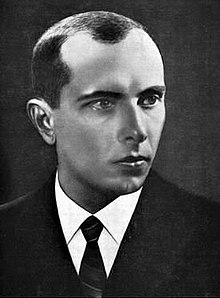 Ukrainian Insurgent Army (UPA) that eventually waged a guerilla war on two fronts, that is both against the Soviet Union and the Third Reich that didn’t hurry to grant independence to the Ukrainian state and imprisoned Stepan Bandera, also confirms this geopolitical rule. The OUN (Organization of Ukrainian Nationalists) and the UPA occupy the central place in the Kremlin’s propagandistic machine that for some unknown reason associates invasion of the Third Reich with the current Euro-Atlanticist “expansion” within the living space of Russia, that is Ukrainian eurointegration negotiations. Further, Western Ukrainian non-Orthodox Greek-Catholics and “Nazis” who once sided with Adolf Hitler and now made a choice in favor of the EU, according to the Kremlin, somehow have managed to overthrow the pro-Russian regime of Victor Yanukovych in Kiev (with the help of the American money) during the Maidan revolution and imposed their “anti-Russian” ideology on the rest of “confused compatriots” who owe everything to Russia.
Ukrainian Insurgent Army (UPA) that eventually waged a guerilla war on two fronts, that is both against the Soviet Union and the Third Reich that didn’t hurry to grant independence to the Ukrainian state and imprisoned Stepan Bandera, also confirms this geopolitical rule. The OUN (Organization of Ukrainian Nationalists) and the UPA occupy the central place in the Kremlin’s propagandistic machine that for some unknown reason associates invasion of the Third Reich with the current Euro-Atlanticist “expansion” within the living space of Russia, that is Ukrainian eurointegration negotiations. Further, Western Ukrainian non-Orthodox Greek-Catholics and “Nazis” who once sided with Adolf Hitler and now made a choice in favor of the EU, according to the Kremlin, somehow have managed to overthrow the pro-Russian regime of Victor Yanukovych in Kiev (with the help of the American money) during the Maidan revolution and imposed their “anti-Russian” ideology on the rest of “confused compatriots” who owe everything to Russia.
Moreover, the Ukrainian nation is often portrayed by the neo-Eurasianists and theorists of Euro-Siberia as a “project” of the Austro-Hungarian, Polish, American and so on secret services that is aimed to undermine Russia’s geopolitical power. In other words, the Ukrainian nation is reduced to the status of the technical anti-Russian project, and nobody considers this vision chauvinistic. Besides, the Kremlin’s historiography has always represented the UPA as the “punitive” army of “cops” in service of the Third Reich that eagerly murdered the civil population; the fact that the identical propaganda is applied today by the Kremlin with regard to the whole Ukrainian nation while the Russian-backed militants kill the very people they claim to defend or shoot down the foreign aircraft only confirms the inconvenient truth about the NKVD officers disguised as the partisans of the UPA who committed the horrific crimes against the civil population in order to denigrate Ukrainian “fascism.”
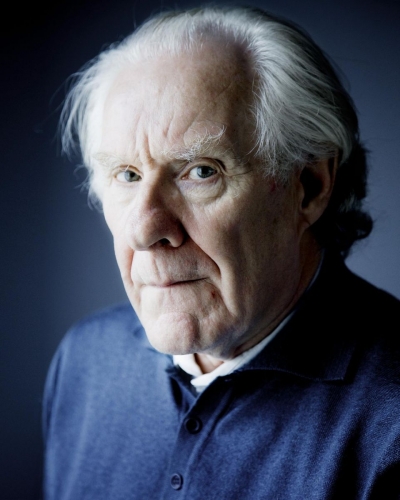 Echoes of the anti-UPA Soviet propaganda may be also found in the account of the Ukrainian events by French leftist philosopher Alain Badiou [13] who considers Ukrainian Orthodox church the most reactionary in the world (“a megalomaniac center of Imperial Orthodoxy”), calls the army of General Vlasov, who turned against the Bolsheviks and founded Russian Liberation Army, a “Ukrainian army” and accuses Ukrainian “Nazi collaborators” of “turning entire villages to blood and fire, including French ones”; not a single word is said about the NKVD crimes, which shows quite well the propagandistic continuity of the new and classic Left and raises a question of whether the authors of New Right, who condemn Ukrainian “ultra-nationalistic” threat and silence the neo-Bolshevik imperialism, are really right-wing. At the same time Badiou draws partially correct parallels between the events in Egypt, Turkey and Ukraine (“Tahrir Square, Taksim Square, the Maidan Square…”) and articulates much clearer than Faye or de Benoist the split between the pro-liberal and identitarian forces (“old-school Ukrainian nationalists who do not at all see their future in terms of ‘European freedoms’”), which was especially bright during Egyptian and Ukrainian revolutions. On condition of disregarding Badiou’s attacks on what is simply called “a titular nation” in Eastern Europe and negative scenario of the possible outcome of Maidan, his warnings against the “finitude,” that is historical reductionism that leads to simplified and distorted representation of the events in Ukraine as “the desire for the West,” are worthy of attention.
Echoes of the anti-UPA Soviet propaganda may be also found in the account of the Ukrainian events by French leftist philosopher Alain Badiou [13] who considers Ukrainian Orthodox church the most reactionary in the world (“a megalomaniac center of Imperial Orthodoxy”), calls the army of General Vlasov, who turned against the Bolsheviks and founded Russian Liberation Army, a “Ukrainian army” and accuses Ukrainian “Nazi collaborators” of “turning entire villages to blood and fire, including French ones”; not a single word is said about the NKVD crimes, which shows quite well the propagandistic continuity of the new and classic Left and raises a question of whether the authors of New Right, who condemn Ukrainian “ultra-nationalistic” threat and silence the neo-Bolshevik imperialism, are really right-wing. At the same time Badiou draws partially correct parallels between the events in Egypt, Turkey and Ukraine (“Tahrir Square, Taksim Square, the Maidan Square…”) and articulates much clearer than Faye or de Benoist the split between the pro-liberal and identitarian forces (“old-school Ukrainian nationalists who do not at all see their future in terms of ‘European freedoms’”), which was especially bright during Egyptian and Ukrainian revolutions. On condition of disregarding Badiou’s attacks on what is simply called “a titular nation” in Eastern Europe and negative scenario of the possible outcome of Maidan, his warnings against the “finitude,” that is historical reductionism that leads to simplified and distorted representation of the events in Ukraine as “the desire for the West,” are worthy of attention.
The aforementioned aspect of the Kremlin’s information warfare against Ukrainian “junta” concerns its presumable anti-Russian character and became especially strong after the successful beginning of the anti-terrorist operation (ATO) in Donbas in spring of 2014. Another reason why the Kremlin ascribed this inadequate term to the Ukrainian authorities is the forceful overthrow of Yanukovych’s regime at Maidan which supposedly makes the newly elected government “illegitimate” and distracts from the fact of the Russian invasion of Ukraine. It was a big surprise for all pro-Russian forces when the leader of “Novorussian” militia Igor Strelkov (Girkin), probably due to the deceived hopes for the historical changes and disappointment with Putin, admitted that Crimean referendum (recognized by “Front National”) was a farce and explained in detail the process of its occupation by Russian “green men” who forced the MPs to vote in favor of Russia [14].
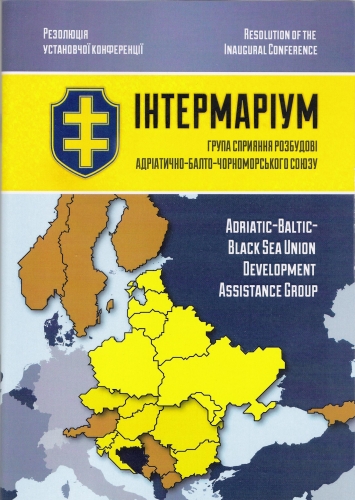 Stereotypical assertions about Crimea that “has always been Russian” or “a Russian territory for at least four centuries populated mainly by Russian populations,” as de Benoist contends, also stand no chance. Crimea was united with the rest of modern Ukrainian territories back in IV century within the Gothic Empire, has always been inhabited by various nationalities and remained under the rule of the Ottoman Empire much longer than the Russian. Besides, namely Ukrainian Zaporozhian Cossacks, who for centuries protected the rest of Europe from the Tatar and Turkish invasion, helped Russian empress Catherine II to conquer Crimea, which ended with destruction of Zaporozhian Sich in 1775 by her order. Only after several waves of resettlement, during which Russians immigrated to Crimea, and deportation of Crimean Tatars, who were a dominant ethnic group in Crimea, by Stalin in 1944, Russians have become the majority of Crimean population. To sum up, Crimea was under the reign of the Russian Empire (134 years) and Russian Soviet Republic (34 years), taken together, maximum for two centuries. Moreover, precisely the lands of Ukrainian Cossacks, which were mentioned in all international treaties as a territory of “Zaporozhian Lower Cossack Host,” have become the core of the “New Russia” after the Küçük Kaynarca peace treaty of 1774 and the destruction of the Sich in 1775 during the Russo-Turkish wars.
Stereotypical assertions about Crimea that “has always been Russian” or “a Russian territory for at least four centuries populated mainly by Russian populations,” as de Benoist contends, also stand no chance. Crimea was united with the rest of modern Ukrainian territories back in IV century within the Gothic Empire, has always been inhabited by various nationalities and remained under the rule of the Ottoman Empire much longer than the Russian. Besides, namely Ukrainian Zaporozhian Cossacks, who for centuries protected the rest of Europe from the Tatar and Turkish invasion, helped Russian empress Catherine II to conquer Crimea, which ended with destruction of Zaporozhian Sich in 1775 by her order. Only after several waves of resettlement, during which Russians immigrated to Crimea, and deportation of Crimean Tatars, who were a dominant ethnic group in Crimea, by Stalin in 1944, Russians have become the majority of Crimean population. To sum up, Crimea was under the reign of the Russian Empire (134 years) and Russian Soviet Republic (34 years), taken together, maximum for two centuries. Moreover, precisely the lands of Ukrainian Cossacks, which were mentioned in all international treaties as a territory of “Zaporozhian Lower Cossack Host,” have become the core of the “New Russia” after the Küçük Kaynarca peace treaty of 1774 and the destruction of the Sich in 1775 during the Russo-Turkish wars.
In other words, fairytales about Ukrainian state “as a gift of Lenin” and the South-East (“Novorussia”) that “has never belonged to Ukraine” are just another part of the anti-Ukrainian propaganda. As a matter of fact, such a gift could not happen, because the Bolsheviks haven’t seized power yet and were not recognized by the Ukrainian government – the Central Rada (Council). The borders of Ukraine in 1917-1918 were shaped solely by the Central Council of the Ukrainian People’s Republic that chose the ethnographic factor (ethnic composition of population and language) as a criterion of demarcation and made a basic administrative unit a province. Besides, further inclusion of other provinces of the former Russian Empire that were inhabited by Ukrainians was also an option (among them were mentioned Kholm, Grodno, Minsk, Kursk, Voronezh, and the Kuban regions).
Likewise, the Ukrainian Soviet Republic was not “nominal” as Faye tries to portray it; anti-Ukrainian chauvinism of the modern Russian government would be impossible in the USSR at the official state level, the same as Putin’s outrageous attempts to prescribe all victories and losses in WW2 solely to Russia and Russians. Further, Crimea was not transferred to Ukraine by the will of Nikita Khrushchev, as it widely believed today, but by Stalinist Georgiy Malenkov and other old members of the Communist party. Besides, they tried to win the loyalty of Ukrainians who had to restore devastated by the war peninsula and made this gift on occasion of the 300th anniversary of the Council of Pereyaslav as a result of which Ukrainian Hetman Bogdan Khmelnytskyi accepted Russian protectorate that was originally meant to be simply a military alliance.
Finally, the historical truth is important, but only the will to defend one’s own lands really counts. In this respect it’s necessary to mention an unexpected position of Byelorussian President Alexandr Lukashenko, who has always been considered a Russian puppet. He not only criticized Ukrainian authorities for giving up Crimea and offered Russia to return its lands to Kazakhstan and Mongolia, but also underlined that Belarus has never been a part of the “Russian world” and swore to protect integrity of Belarus in case of facing the threat of “the green man”: “Somebody thinks that there was no such country… It was not, but now it exists, and this must be considered. And we will not give our land to anyone” [15].
Pro-Russian sentiments of rightists are largely based on ignorance and wishful thinking. They have no idea about Russian “anti-extremist” laws and Putin’s war on historical revisionism, revisionism of the outcomes of WW2, Neo-Nazism, rehabilitation of fascism and glorification of Nazi collaborators on occasion of which he invited rabbis from Israel and Europe to take part in the conference in occupied Sebastopol (July of 2014). Not only Russian nationalists but also liberals who disagree with the authorities are effectively suppressed under 282 article of the Russian Penal code. These are the fruits of the well-known to Germans Historikerstreit (“Historians’ Dispute”) of 1986-87 which demonstrated solidarity of German and Soviet leftists regarding the German and, wider, European guilt and criminalized even the scientific study of these topics. Actually, namely Fyodor Dostoyevsky, who started his path as a leftist and is one of the biggest Russian conservative authorities, openly stated that a natural ally of Russian conservative is not a European rightist, but a European leftist as the one who desires complete destruction of the European order [16], which proves collaboration of Alexandr Dugin with Greek leftists “Syriza.”
Furthermore, according to the recent confession of the leader of the largest Russian right-wing organization (ethnopolitical association “Russians”) Dmitry Demushkin, who had to undergo a humiliating search by the FSB for the eighth time, “the Kremlin simply persecutes nationalists, and the force structures threaten them independent of the position of the nationalist on any particular question [such as Ukraine]. You can even glorify Putin, but this is no guarantee that you won’t be arrested or treated illegally. One must love Putin only with permission” [17]. Not surprisingly, this organization wrote an appeal to all European right-wing and conservative movements and organizations in which its Council highlighted concrete political steps of the Russian regime which ruin Russia ethnically and economically and urged them to respect the struggle of Russian comrades and not to support Putin. They added that annexation of Crimea and war in Donbas much worsened the situation of Russians and that defense of the rights of Russians is just a pretext for economic exploitation and further destruction of the Slavic world and unity [18].
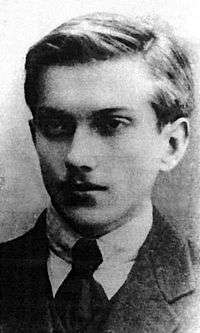 Thus Ukrainian nationalists, traditionalists and patriots realize that we deal with competition of the two poles of globalism that spring from the same root and justify themselves through reference to different mythologies. Authentic Ukrainian analogue of the European conception of Mitteleuropa is the project of Baltic-Black Sea Alliance (Union, Unia) that was developed, above all, by Ukrainian geopolitician Yury Lypa, the author of “The Black Sea Doctrine” and other works. One of the main Lypa’s ideas was rejection of the alien and destructive for Ukraine “East-West” dilemma (between Catholicism and Orthodoxy, West and Russia, liberalism and despotism, etc. that make Ukrainians look as a product of mix, say, between Poles and Russians) in favor of the traditional and natural for Ukraine orientation “North-East.” Lypa highly estimates both Germanic and Southern factors in Ukrainian history: for example, from the north came Goths and Normans (Vikings) who played an important political and state-building role, the south has always been the direction of Ukrainian cultural, military and trade expansion. The Baltic-Black Sea alliance as the third geopolitical way is partially connected with the Euro-Atlanticist integration, since some Eastern European and Baltic countries are members of the EU and NATO, but it aims at building of a sovereign geopolitical bloc which, apart from Eastern European and Baltic, could also include Scandinavian countries, as well as European part of Russia. It may become a starting point for the great European Reconquista which is heralded at present by the “Azov” regiment. The authoritative figures of the Right who produce the pro-Kremlin overviews of the events in Ukraine won’t change history and the logic of the struggle for the Ukrainian statehood and will only understand less and less in the Ukrainian developments along with their misguided readers.
Thus Ukrainian nationalists, traditionalists and patriots realize that we deal with competition of the two poles of globalism that spring from the same root and justify themselves through reference to different mythologies. Authentic Ukrainian analogue of the European conception of Mitteleuropa is the project of Baltic-Black Sea Alliance (Union, Unia) that was developed, above all, by Ukrainian geopolitician Yury Lypa, the author of “The Black Sea Doctrine” and other works. One of the main Lypa’s ideas was rejection of the alien and destructive for Ukraine “East-West” dilemma (between Catholicism and Orthodoxy, West and Russia, liberalism and despotism, etc. that make Ukrainians look as a product of mix, say, between Poles and Russians) in favor of the traditional and natural for Ukraine orientation “North-East.” Lypa highly estimates both Germanic and Southern factors in Ukrainian history: for example, from the north came Goths and Normans (Vikings) who played an important political and state-building role, the south has always been the direction of Ukrainian cultural, military and trade expansion. The Baltic-Black Sea alliance as the third geopolitical way is partially connected with the Euro-Atlanticist integration, since some Eastern European and Baltic countries are members of the EU and NATO, but it aims at building of a sovereign geopolitical bloc which, apart from Eastern European and Baltic, could also include Scandinavian countries, as well as European part of Russia. It may become a starting point for the great European Reconquista which is heralded at present by the “Azov” regiment. The authoritative figures of the Right who produce the pro-Kremlin overviews of the events in Ukraine won’t change history and the logic of the struggle for the Ukrainian statehood and will only understand less and less in the Ukrainian developments along with their misguided readers.
Notes:
- 1) Alain de Benoist on Ukraine (Part 1) <http://openrevolt.info/2014/04/06/alain_de_benoist_ukraine/>; (Part 2) <http://openrevolt.info/2014/04/20/alain_de_benoist_ukraine_2/>
- 2) Александр Дугин, Консервативная Революция (Москва: Арктогея, 1994, с. 32).
- 3) Robert Steuckers, Interview with Pavel Tulaev <http://robertsteuckers.blogspot.com/2014/02/answers-to-questions-of-pavel-tulaev.html>
- 4) Ibid.
- 5) Олег Бахтияров, Майдан и Юго-Восток Украины: три ошибки Кремля <http://artpolitinfo.ru/oleg-bahtiyarov-maydan-i-yugo-vostok-ukrainyi-ili-tri-oshibki-kremlya/>
- 6) Robert Steuckers, Interview with Pavel Tulaev <http://robertsteuckers.blogspot.com/2014/02/answers-to-questions-of-pavel-tulaev.html>
- 7) Julius Evola, Presuppositions of the European Union (North American New Right, San Francisco: Counter-Currents Publishing Ltd., 2012, Volume 1, p. 19).
- 8) Ernst Jünger, The Peace (Hinsdale, Illinois: Henry Regnery Company, 1948, p. 65-66).
- 9) Ian B. Warren, The Heritage of Europe’s “Revolutionary Conservative Movement.” A Conversation with Swiss Historian Armin Mohler <http://www.ihr.org/jhr/v14n5p3_warren.html>
- 10) Кто из нас правый? Письмо французского лидера «НОВЫХ ПРАВЫХ» Алена де Бенуа редакции журнала АТЕНЕЙ <http://velesova-sloboda.vho.org/actual/newrightwing.html>
- 11) Павел Тулаев, Современные вызовы славянскому миру <http://suzhdenia.ruspole.info/node/5401>; Павел Тулаев об успехах и противоречиях новых правых < http://modus-agendi.org/articles/3374>
- 12) Guillaume Faye, Ukraine: Understanding the Russian Position <http://www.counter-currents.com/2014/03/ukraine-understanding-the-russian-position/>; Guillaume Faye, On the Russian Annexation of Crimea <http://www.counter-currents.com/2014/03/on-the-russian-annexation-of-crimea/>; Guillaume Faye, Vive Poutine, la bête noire des bien pensants <http://www.gfaye.com/vive-poutine-la-bete-noire-des-bien-pensants/>
- 13) Alain Badiou, A present defaults – unless the crowd declares itself: Alain Badiou on Ukraine, Egypt and finitude <http://www.versobooks.com/blogs/1569-a-present-defaults-unless-the-crowd-declares-itself-alain-badiou-on-ukraine-egypt-and-finitude>
- 14) Moscow Agent Strelkov Admits Russian Army Behind Crimea Referendum <http://uatoday.tv/news/moscow-agent-strelkov-admits-russian-army-behind-crimean-referendum-404995.html>
- 15) Lukashenko: Belarus is not Part of the Russia World <http://www.unian.info/politics/1038195-lukashenko-belarus-is-not-part-of-russian-world.html>
- 16) Федор Достоевский, Дневник писателя, Книга 1 (Москва: Астрель: Аст, 2007, с. 354-355).
- 17) Putin Targets All Russian Nationalists <http://windowoneurasia2.blogspot.com/2015/03/putin-targets-all-russian-nationalists.html>
- 18) Appeal of Russian Nationalists to European (White) Nationalist (Right) and Conservative Organizations <http://vnnforum.com/showthread.php?t=253240>; Original <http://rusnat.com/2015/03/11929/>
11:50 Publié dans Actualité, Affaires européennes, Géopolitique | Lien permanent | Commentaires (0) | Tags : ukraine, europe, affaires européennes, olena semenkaya, nationalisme ukrainien, politique internationale, russophobie |  |
|  del.icio.us |
del.icio.us |  |
|  Digg |
Digg | ![]() Facebook
Facebook
HISTORIA DEL SEGUNDO PERIODO DEL MOVIMIENTO JOVEN EUROPA EN ESPAÑA (1964-1971)
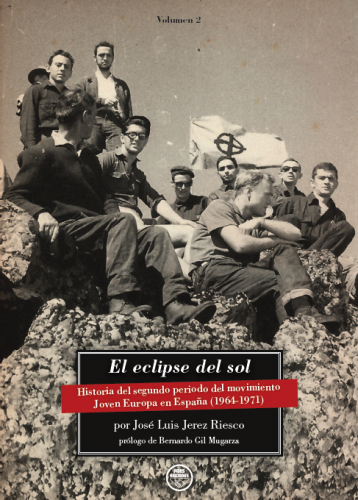
LIBRO:
EL ECLIPSE DEL SOL. HISTORIA DEL SEGUNDO PERIODO DEL MOVIMIENTO JOVEN EUROPA EN ESPAÑA (1964-1971)
de José Luis Jerez Riesco
Con un prólogo de Bernardo Gil Mugarza
Pedidos: edicionesfides@yahoo.es
396 págs.
PVP: 25 euros
Orientaciones:
Jean Thiriart, quien me distinguió además con su sincera amistad hasta su temprano fallecimiento en 1992, era un organizador nato, un excelente orador y un pensador profundo. En mi opinión, y por esas tres condiciones, fue un líder carismático excepcional.
Los ideales comunes en todas las Secciones nacionales de Joven Europa quedaron plasmados en el semanario del mismo nombre, en las revistas mensuales “L’Europe Communautaire” y “La Nation Européenne, en los “Argumentaires”, en las 350 “Communications” internas y especialmente en los libros “Europa, un imperio de 400 millones de hombres” –editado en España con el título de “Arriba Europa”-, “El Imperio eurosoviético, desde Vladivostok a Dublín” y en las 106 respuestas a las preguntas que le formulé en 1983.
La crónica de aquella lucha titánica, en medio de un ambiente difícil y batallador, queda reflejada en este libro de mi viejo amigo y camarada José Luis Jerez Riesco que vivió, dentro de la Organización, sus últimos compases de esperanza.
[del prólogo de Bernardo Gil Mugarza]
Índice:
Prólogo
- La situación de “Jeune Europe” en 1964
- Joven Europa renace de sus cenizas en España
III. La lucha de Joven Europa en 1965. Un año de turbulencias
- “Un imperio de 400 millones de hombres: Europa”
- La escuela de cuadros de Joven Europa
- El nuevo año 1966 amanece con renovado optimismo
VII. El campo europeo de trabajo en Torices -Santander-, organizado por Joven Europa
VIII. Jean Thiriart pronuncia sendas conferencias en Santander y Bilbao
- Jean Thiriart habla en la capital de España
- La Sección Española de Joven Europa después de la euforia del verano de 1966
- El congreso España-Europa convocado por Joven Europa en Madrid, en marzo de 1967
XII. El declive de Jeune Europe
Anexo: Relación de camaradas de la Sección Española de Joven Europa, de los que existe referencia
Bibliografía y fuentes
Anexo documental
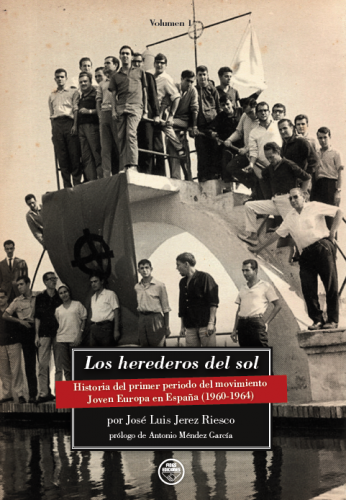
Los herederos del sol. Historia del primer periodo del movimiento Joven Europa en España (1960-1964)
01:47 Publié dans Histoire, Livre, Livre | Lien permanent | Commentaires (0) | Tags : jean thiriart, européisme, nationalisme européen, continentalisme, jeune europe, europe, affaires européennes, nationalisme révolutionnaire, années 60, histoire, livre, belgique, espagne, joven europa |  |
|  del.icio.us |
del.icio.us |  |
|  Digg |
Digg | ![]() Facebook
Facebook


